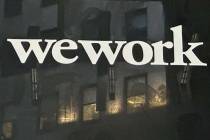Former justice to hear challenge by casinos
CARSON CITY -- Former Nevada Supreme Court Justice Miriam Shearing will hear the challenge filed by Nevada casinos against a teachers' union petition to raise gambling taxes to fund education.
A Jan. 18 hearing has been set to review the Nevada Resorts Association lawsuit against the initiative backed by the Nevada State Education Association that would raise $250 million a year for public schools.
The measure seeks to raise by 3 percent the gross gaming revenue tax now paid by casinos making more than $1 million a month. That would increase their tax rate from 6.75 percent to 9.75 percent.
NSEA President Lynn Warne said the rate would still be among the lowest casino tax rates in the world.
The petition is similar to one filed by NSEA in 2001 that sought to impose a 4 percent tax on the profits of all Nevada businesses making more than $50,000 a year, with the money dedicated to public schools.
That question was taken off the ballot by the Nevada Supreme Court for violating a law that confines an initiative petition to one subject. Shearing, who retired to become a senior judge at the end of 2004, was a member of the Supreme Court at that time and voted with the majority to take the question off the ballot.
The new petition is being challenged on the same grounds as the 2001 petition: That it covers more than one subject area and that it's brief introductory "Explanation of Effect" is misleading and doesn't match what the actual petition would do if added to the Constitution.
Besides the teachers' plan, Las Vegas lawyer Kermitt Waters also has filed two ballot initiatives to raise taxes on Nevada's biggest casinos by about 20 percent.
Waters said his plans are similar, although one also would eliminate property taxes on primary residences. He said he filed both with the secretary of state's office so that voters could decide which one they want.
To qualify for a spot on the ballot, backers need to gather at least 58,628 signatures by May 20. Voters would then have to approve the measures in the 2008 and 2010 elections. The one that gets the most voter support in 2010 would take effect.























